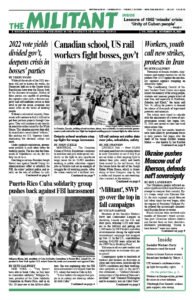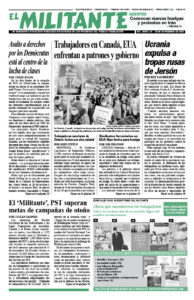Thousands of Iranian students, shopkeepers and workers heeded the call for protests Nov. 15-17 against the reactionary capitalist regime’s trampling on democratic rights.
“The Coordinating Council of Iranian Teachers Trade Unions once again honors the memory of the young people, students and innocent people killed all over Iran, and especially in Kurdistan, Zahedan and Khash,” the union said Nov. 14, calling for protests to demand the release of thousands of imprisoned protesters and unionists.
The actions were timed to coincide with the anniversary of a wave of anti-government actions that began Nov. 15, 2019, and spread to cities and rural towns across Iran.
Over the past two months, hundreds have been killed by government forces at daily protests that began after the death of the young Kurdish woman Mahsa — also known by her Kurdish name Gina — Amini. She died three days after the hated “morality” police arrested her in Tehran for violating the regime’s reactionary dress code.
The attacks by the police, the Islamic Revolutionary Guard Corps and thugs known as the Basij have come down hardest in regions that are home to oppressed nationalities, especially Kurds, Baluch and Azerbaijanis.
“The oppressors imagine that by imprisoning and assassinating freedom fighters, this struggle will be suppressed,” the Haft Tappeh Sugar Cane Workers Union said Nov. 14. “But history has shown the opposite.” Along with backing the slogan “Woman, life, freedom!” the union added, “Bread, work, freedom!” and called for releasing protesters and unionists imprisoned by the regime.
A coalition of 20 university student groups from around the country appealed to “workers, teachers, retirees, farmers, nurses, doctors. In a word, all those who sympathize with us.”
“We are the children of the workers. We will stand by them,” the student groups said, noting their excitement when they heard about strikes by oil workers and expressing support for the release of imprisoned teachers, and for farmers fighting for water rights.
The movement takes place amid a deep economic crisis — meat consumption fell 50% in the last year — and opposition by working people to the deadly toll of the regime’s military operations in Lebanon, Syria, Iraq and beyond.
The Islamic Revolutionary Guard launched drone and missile attacks into Iraqi Kurdistan Nov. 14, targeting Kurdish groups they accuse of fomenting protests inside Iran. Guard Corps commander Hamza al-Shohada says the attacks will continue until Baghdad or the Kurdistan Regional Government there disarms the groups.
The historic Tehran Grand Bazaar and commercial districts across the country were shut down tight Nov. 15, except for hundreds of protesters filling the streets as shopkeepers joined the call to action.
Steelworkers on strike
Workers at the Shad Abad market for steel and other industrial products in Tehran went on strike Nov. 15, chanting “Freedom! Freedom!” and “Down with the dictator!” Workers at the Iran Zob steel foundry in Isfahan struck the same day, chanting “Promises are not enough, our table is empty!”
On the Pars offshore oil platforms, workers ended their hunger strike after company officials promised a wage increase next month and a retroactive increase. Workers say if that’s not done they will strike again.
Tens of thousands of working people took to the streets in the Sistan-Baluchistan region in southeast Iran — the country’s most rural and poorest area — Nov. 11 to commemorate the “Black Friday” massacre of 66 or more people by police snipers and the Guard in Zahedan Sept. 30. Another 18 were killed at a protest Nov. 4 in the Baluch city of Khash.
The Shiite-based clerical regime in Tehran claims the police were defending themselves from Sunni Baluch separatists who had attacked a police station.
“Today it has become clear that people were killed unjustly,” Molavi Abdulhamid Ismaeelzahi, Iran’s most prominent Sunni cleric, said during the Nov. 11 prayer service in Zahedan. “Those who ordered Bloody Friday and its perpetrators must be brought to trial.”
With outrage over the massacres widespread, Iran Supreme Leader Ayatollah Ali Khamenei, ordered the release of 100 of those arrested in Baluchistan and promised an investigation. Khamenei sent an envoy to the region who announced “rioters” would be “dealt with decisively,” but that “innocent” people killed by the regime would be given the status of martyrs.

